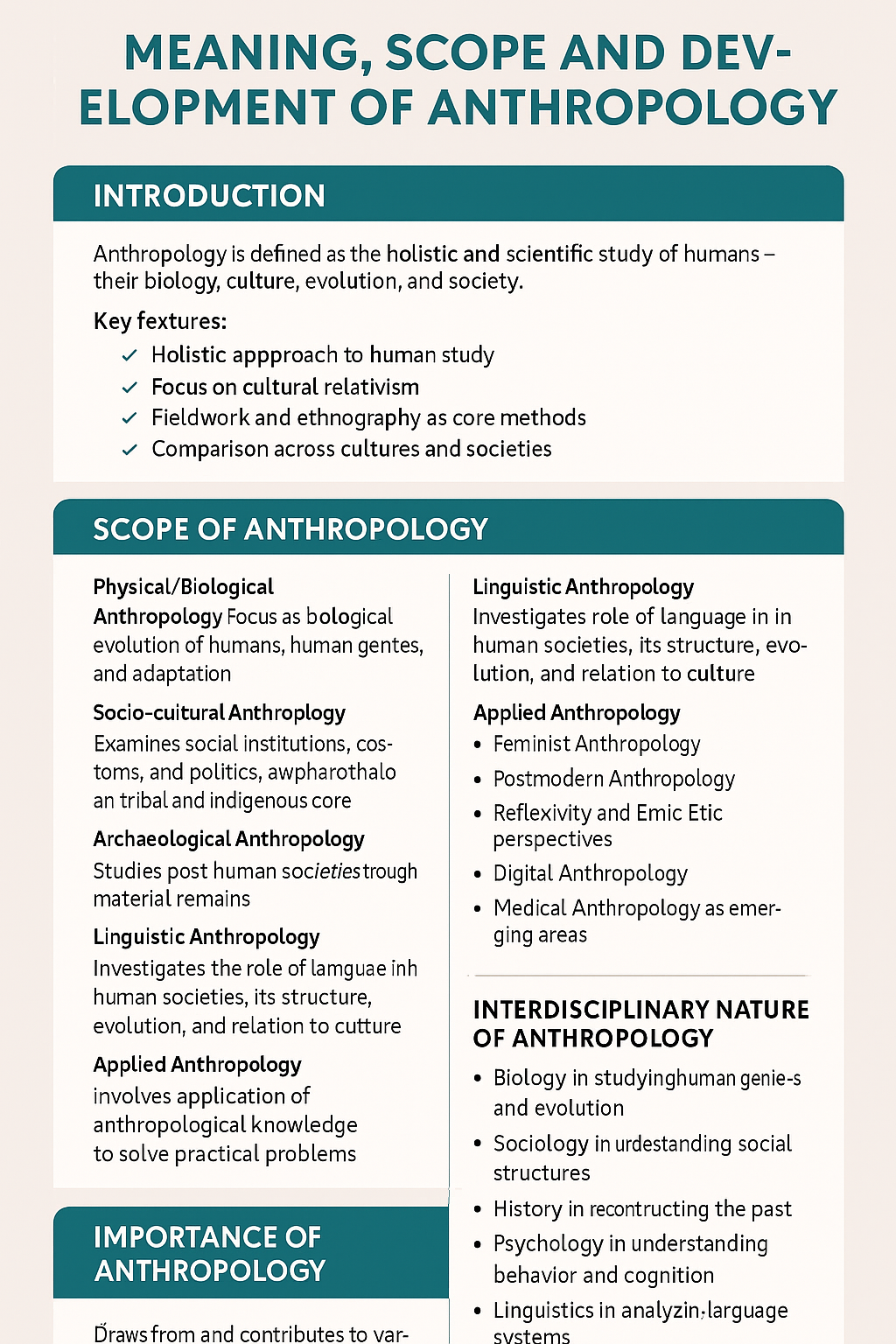
20 Jul Meaning, Scope and Development of Anthropology
Meaning, Scope and Development of Anthropology – UPSC Anthropology Optional Notes
Introduction
Anthropology, derived from the Greek words “anthropos” (human) and “logos” (study), is the holistic and scientific study of humans – their biology, culture, evolution, and society – across time and space. It is unique in combining scientific and humanistic approaches to understand the full sweep of human diversity.
Meaning of Anthropology
Anthropology is the study of human beings in totality. It seeks to explore the biological, cultural, and social aspects of humans in both past and present contexts. It involves understanding human evolution, biological traits, customs, social structures, languages, and belief systems.
Key features:
- Holistic approach to human study
- Focus on cultural relativism
- Fieldwork and ethnography as core methods
- Comparison across cultures and societies
Scope of Anthropology
The scope of anthropology is vast. It covers every aspect of human life. Traditionally, it is divided into four main subfields:
1. Physical/Biological Anthropology
This subfield focuses on the biological evolution of humans, human genetics, primatology, forensic anthropology, and human adaptation to different environments.
2. Socio-cultural Anthropology
It examines social institutions, customs, kinship, marriage, economy, religion, and politics among various human societies, especially tribal and indigenous communities.
3. Archaeological Anthropology
This field studies past human societies through material remains such as tools, pottery, monuments, and settlement sites to reconstruct history and cultural evolution.
4. Linguistic Anthropology
It investigates the role of language in human societies, its structure, evolution, and how language shapes communication, identity, and culture.
5. Applied Anthropology
It involves the application of anthropological knowledge to solve practical problems in areas such as public health, development, education, and tribal welfare.
Development of Anthropology
The evolution of anthropology as a discipline can be traced through several important phases:
I. Early Roots
Anthropological ideas can be found in ancient Greek, Roman, and Indian texts, where questions about human origin, society, and culture were explored.
II. Emergence of Anthropology as a Discipline (19th Century)
- Evolutionism: Scholars like E.B. Tylor and Lewis H. Morgan proposed unilinear evolutionary models of society.
- Diffusionism: Emphasized cultural borrowing and diffusion of traits.
- Historical Particularism: Championed by Franz Boas, it argued for detailed fieldwork and cultural relativism.
III. 20th Century Developments
- Functionalism: Emphasized social institutions and their roles (e.g., Bronislaw Malinowski, A.R. Radcliffe-Brown).
- Structuralism: Focused on underlying structures in culture and thought (e.g., Claude Lévi-Strauss).
- Neo-evolutionism and Cultural Materialism: Julian Steward and Marvin Harris brought ecological and materialist approaches.
IV. Modern Trends
- Feminist Anthropology
- Postmodern Anthropology
- Reflexivity and Emic-Etic perspectives
- Digital Anthropology, Urban Anthropology, and Medical Anthropology as emerging areas
Interdisciplinary Nature of Anthropology
Anthropology draws from and contributes to various other disciplines:
- Biology: in studying human genetics and evolution
- Sociology: in understanding social structures
- History: in reconstructing the past
- Psychology: in understanding behavior and cognition
- Linguistics: in analyzing language systems
Importance of Anthropology in UPSC and Governance
Anthropology helps in understanding:
- India’s diverse tribal population and their issues
- Policy planning and implementation for marginalized communities
- Health, education, and development issues in rural areas
- Fieldwork-based insights for inclusive governance
Previous Year Questions (PYQs) – UPSC Anthropology Paper 1
- 2023: Discuss the relevance of applied anthropology in addressing contemporary social problems.
- 2022: Examine the scope of physical anthropology in the study of human biology and evolution.
- 2020: Define anthropology and discuss its scope with suitable examples.
- 2019: Write a brief note on the relationship between anthropology and other social sciences.
- 2018: Trace the development of anthropology in the 19th and 20th centuries.
Probable Questions for UPSC Mains 2025
- What is the significance of anthropology in contemporary India?
- Discuss the holistic nature of anthropology with examples.
- Evaluate the contribution of Franz Boas in shaping modern anthropology.
- How does anthropology bridge the gap between natural sciences and social sciences?
- Explain the interdisciplinary character of anthropology with special reference to public policy.
Conclusion
The subject of anthropology offers a unique blend of scientific inquiry and cultural understanding. Its holistic nature allows aspirants to approach human society and behavior with empathy, critical thinking, and depth. For UPSC aspirants, especially those choosing anthropology as an optional subject, mastering the foundational theme of its meaning, scope, and development is essential for tackling Paper 1 with confidence.




No Comments